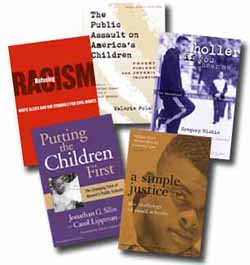Race, Justice, Poverty Part of Unique TC Book Series
When J. Waties Waring was growing up in the 1890s, in Charleston, South Carolina, the last thing he expected was to become a champion for racial justice. He would be educated in the finest southern schools as a lawyer and become a popular member of the Charlestonian aristocracy. But by the late 1930s, the federally appointed judge underwent an astonishing "race conversion" that turned him into an outspoken critic of segregation, a key legal influence for voting and civil rights to come and a target of violence by his white supremacist neighbors and "friends."
Waring's astounding transformation and contribution to racial justice is chronicled in Cynthia Stokes Brown's book, Refusing Racism: White Allies and the Struggle for Civil Rights, published this year by Teachers College Press. Brown, a Professor Emerita of Education at Dominican University of California, also explores the efforts of Virginia Durr, a political activist from Alabama; Anne McCarty Braden, a journalist from Louisville, Kentucky; and Herbert R. Kohl, a writer and educator from New York City. Brown tells their stories, "to show in detail, how some of those considered white were able to join unequivocably in the fight for liberation of those considered other "races" as well as for their own freedom from racism. "I do this," Brown writes, "to provide role models of antiracist white identity and action."
Brown's vision and the book reflect the unique mission of Teachers College Press' popular series, Teaching for Social Justice Series. The collaborative series, which to date includes eight books, began in 1997 when series editor, William Ayers, TC '87, board member for Bank Street College and distinguished professor in the College of Education at the University of Illinois in Chicago, asked his graduate students to look for teachers who were explicitly teaching toward social justice. What happened as a result was a collection of portraits of teachers who were addressing social problems and seeking lasting change through the process of education, not through traditional political means.
Ayers, who is also a former student of TC's aesthetics education pioneer, Maxine Greene, was so inspired by his students' findings that he approached both Greene and TC Press Director Carole Saltz. Together, they realized there was so much important material linking education with justice that a book series could be launched. An editorial advisory board of academic and interdisciplinary voices was formed to meet annually, and the Teaching for Social Justice Series was born.
It's timing couldn't be more relevant, Greene believes. "With the pursuit of social justice set aside and many of our freedoms in danger we cannot but welcome this series and its truly educative power," she says.
The goals of the series, according to the editors, is to encourage the new voices and new ideas that contribute to the serious exchange of enduring questions in education. The books, they hope, will promote an ongoing discussion of the elements and impacts of education and justice.
Other books in the series include Tom Roderick's A School of Our Own: Parents, Power and Community at the East Harlem Block Schools; The White Architects of Black Education: Ideology and Power in America, 1865-1954 by William H. Watkins; and Walking the Color Line: The Art and Practice of Anti-racist Teaching by Mark Perry.
"We're hoping to expand the series as we find authors willing to take us to new areas where the question of justice was not seen before but could in fact be a central force in our teaching," Ayers says. "Teaching for social justice continues the difficult task of constructing and reinvigorating a public. It builds on a fundamental message of the teacher-you must change your life-and goes a notch deeper: you can change the world."
The article was written by Jo Kadlecek, Staff Writer at the Columbia University Record and edited by Inside TC.
Published Monday, Mar. 3, 2003
